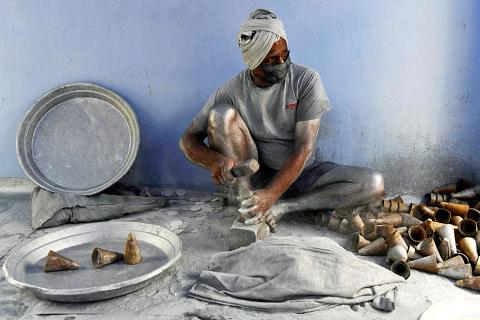Pollution levels in India’s capital, New Delhi, have hit their worst for the second time this month — earning a “very poor” rating and indicating air quality could deteriorate further after the Hindu festival of Diwali.
The air quality index, which measures the concentration of poisonous particulate matter, yesterday touched 388 in New Delhi, according to US embassy data, way above the “safe” limit of 60.
The index measures the concentration of tiny poisonous particulate matter — PM2.5, particles that are less than 2.5 microns in diameter and can be carried deep into the lungs, causing deadly diseases, including cancer and cardiac problems.

Photo: AFP
Senior government officials, who did not wish to be identified because they are not authorized to talk to media, said the main reason behind the sharp deterioration in air quality was a lack of wind speed.
A thick, toxic haze could envelop New Delhi and neighboring cities if the authorities fail to clamp down on fireworks to celebrate Diwali tomorrow.
Air quality usually starts worsening in New Delhi ahead of the Hindu festival of light.
The Supreme Court last year allowed the use of only “safe and green firecrackers,” for a maximum two hours, and only in designated areas, such as parks, aiming to lessen the risk to health.
However, authorities failed to enforce the decree and crackers continued to crackle late into the night.
As a result, PM2.5 levels in some parts of the city soared to 689 the next day, indicating emergency conditions.
To avoid a repeat of last year and wean residents away from bursting tens of thousands of firecrackers, New Delhi authorities are offering residents laser light shows to mark Diwali this year.
Other than the smog triggered by firecrackers, smoke from the surrounding countryside, where farmers at this time of the year burn the crop residue in their fields to prepare for winter sowing, causes pollution in New Delhi and surrounding cities.
Among a host of measures to curb pollution, the city government of New Delhi has decided to restrict use of private cars from Nov. 4 to 15.
Some of the other steps include banning diesel-run generators and burning of garbage.

In the sweltering streets of Jakarta, buskers carry towering, hollow puppets and pass around a bucket for donations. Now, they fear becoming outlaws. City authorities said they would crack down on use of the sacred ondel-ondel puppets, which can stand as tall as a truck, and they are drafting legislation to remove what they view as a street nuisance. Performances featuring the puppets — originally used by Jakarta’s Betawi people to ward off evil spirits — would be allowed only at set events. The ban could leave many ondel-ondel buskers in Jakarta jobless. “I am confused and anxious. I fear getting raided or even

Kemal Ozdemir looked up at the bare peaks of Mount Cilo in Turkey’s Kurdish majority southeast. “There were glaciers 10 years ago,” he recalled under a cloudless sky. A mountain guide for 15 years, Ozdemir then turned toward the torrent carrying dozens of blocks of ice below a slope covered with grass and rocks — a sign of glacier loss being exacerbated by global warming. “You can see that there are quite a few pieces of glacier in the water right now ... the reason why the waterfalls flow lushly actually shows us how fast the ice is melting,” he said.

Eleven people, including a former minister, were arrested in Serbia on Friday over a train station disaster in which 16 people died. The concrete canopy of the newly renovated station in the northern city of Novi Sad collapsed on Nov. 1, 2024 in a disaster widely blamed on corruption and poor oversight. It sparked a wave of student-led protests and led to the resignation of then-Serbian prime minister Milos Vucevic and the fall of his government. The public prosecutor’s office in Novi Sad opened an investigation into the accident and deaths. In February, the public prosecutor’s office for organized crime opened another probe into

RISING RACISM: A Japanese group called on China to assure safety in the country, while the Chinese embassy in Tokyo urged action against a ‘surge in xenophobia’ A Japanese woman living in China was attacked and injured by a man in a subway station in Suzhou, China, Japanese media said, hours after two Chinese men were seriously injured in violence in Tokyo. The attacks on Thursday raised concern about xenophobic sentiment in China and Japan that have been blamed for assaults in both countries. It was the third attack involving Japanese living in China since last year. In the two previous cases in China, Chinese authorities have insisted they were isolated incidents. Japanese broadcaster NHK did not identify the woman injured in Suzhou by name, but, citing the Japanese